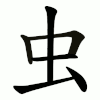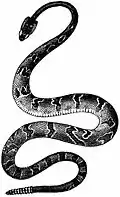虫
| ||||||||
| ||||||||
Translingual
| Stroke order | |||
|---|---|---|---|
 | |||
Han character
虫 (Kangxi radical 142, 虫+0, 6 strokes, cangjie input 中一戈 (LMI), four-corner 50136, composition ⿱中⿰㇀丶)
- Kangxi radical #142, ⾍.
Derived characters
References
- KangXi: page 1076, character 19
- Dai Kanwa Jiten: character 32804
- Dae Jaweon: page 1545, character 7
- Hanyu Da Zidian (first edition): volume 4, page 2833, character 1
- Unihan data for U+866B
Chinese
Glyph origin

| Historical forms of the character 虫 | ||
|---|---|---|
| Shang | Western Zhou | Shuowen Jiezi (compiled in Han) |
| Oracle bone script | Bronze inscriptions | Small seal script |
 |
 |
 |
Pictogram (象形) : a snake.
The character originally represented a type of venomous snake, while the derivative 蟲/虫 represented worms and insects (or insect-like things). 虫 was later borrowed for 蟲/虫 (possibly via simplification), and the character 虺 was created to represent the original meaning.
Etymology 1
| For pronunciation and definitions of 虫 – see 蟲 (“insect; bug; creature, animal; etc.”). (This character, 虫, is the simplified and variant form of 蟲.) |
Notes:
|
Japanese
| 虫 | |
| 蟲 |
Kanji
(grade 1 “Kyōiku” kanji, shinjitai kanji, kyūjitai form 蟲)
- insect, bug
- generic name for animals
Readings
As shinjitai form of 蟲:
- Go-on: じゅう (jū)←ぢゆう (dyuu, historical)
- Kan-on: ちゅう (chū, Jōyō)←ちゆう (tyuu, historical)
- Kun: むし (mushi, 虫, Jōyō)
As the ancient form of 虺:
Compounds
Etymology
| Kanji in this term |
|---|
| 虫 |
| むし Grade: 1 |
| kun’yomi |
| Alternative spelling |
|---|
| 蟲 (kyūjitai) |
/musi/ → /muɕi/
(This etymology is missing or incomplete. Please add to it, or discuss it at the Etymology scriptorium.)
Noun
虫 • (mushi)
- a bug, insect, worm
- Synonym: 昆虫 (konchū)
- a serpent, snake
- 獅子身中の虫
- shishi shinchū no mushi
- a serpent in a lion
- Synonym: 蛇 (hebi)
- 獅子身中の虫
- (figurative): a worm (person living for only one thing)
- 本の虫
- hon no mushi
- a bookworm
- 本の虫
- (derogatory): a worm (despicable person)
- a temperament (thought which is in the deep in mind) (Can we verify(+) this sense?)
- 癇の虫
- kan no mushi
- a choleric temperament
- 癇の虫
- (archaic) a male lover
Derived terms
- 虫食い (mushikui, “worm-eaten”)
- 虫酸, 虫唾 (mushizu, “heartburn”)
- 虫歯 (mushiba, “bad tooth, dental caries, cavity”)
- 虫偏 (mushihen)
- 虫眼鏡 (mushi megane, “magnifying glass”)
- 青虫 (aomushi)
- 油虫 (aburamushi, “cockroach”)
- 毛虫 (kemushi, “caterpillar”)
- 座頭虫 (zatōmushi, “harvestman”)
- 鈴虫 (suzumushi)
- 長虫 (nagamushi)
- 泣き虫 (nakimushi, “crybaby”)
- 鋏虫, 蠼螋 (hasamimushi, “earwig, maritime earwig”)
- 水虫 (mizumushi)
- 松虫 (matsumushi)
- 蝮 (mamushi, “viper”)
- 弱虫 (yowamushi, “weakling”)
Korean
Etymology 1
From Middle Chinese 蟲 (MC ɖɨuŋ).
Etymology 2
From Middle Chinese 虫 (MC hʉiX).
Hanja
Vietnamese
Han character
虫: Hán Việt readings: trùng (
虫: Nôm readings: tròng[1][2], trùng[1][2], chòng[1], chùng[3]
References
- Nguyễn (2014).
- Nguyễn et al. (2009).
- Trần (2004).
- Bonet (1899).
- Génibrel (1898).